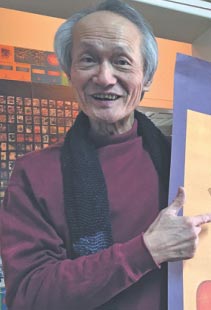Master of arts and guardian of crafts
By Peng Yining ( China Daily ) Updated: 2016-03-12 10:11:32
 |
|
Huang Yuangsung. [Photo by Peng Yining/China Daily] |
Huang has shown himself adept at adapting to the times to ensure that the magazine does not go the way of crafts that have disappeared.
In 2003 Han Sheng began publishing in Beijing, putting out editions for mainland audiences, and to mark the start of the Year of the Monkey, on Feb 8, Han Sheng worked with Baidu to produce a traditional paper-cut monkey for the front page of the Chinese Internet search engine's maps section.
"It's good to see traditional monkey images being used as motifs on an Internet site," Huang says. "That raises awareness among people of the skills of paper cutting. I know people of the present age can appreciate the beauty and skill of traditional arts. But what we need to do is to ensure those arts do not become extinct."
One people, one sense of history
In 1988, Taiwan authorities for the first time allowed the elderly to return to the mainland and visit their families. Huang accompanied his father-in-law, a former Kuo-mintang airman, on a trip to Hubei province, where his father-in-law was born and raised.
From then on, Huang began collecting material on the mainland.
"I saw my father-in-law draw a map of his hometown and put a small red spot on his home village because he missed his home but couldn't go back," Huang says.
Huang also accompanied many other veterans returning to the mainland and says he was touched by the deep emotional attachment that they had with their hometowns.
In the 1980s elderly people from Taiwan flying to the mainland had to transfer in Hong Kong and then enter the mainland through Guangdong.
"Veterans were talking and laughing on the train from Hong Kong to Guangzhou, really excited about going home," Huang says. "Once the train crossed the Guangdong border, silence descended in the carriages and everyone peered at the scenery, something they had not seen for decades. The mainland had changed. Many had tears in their eyes."
Huang says that in his group was a 60-year-old who said little and seemed serene, but in Guangzhou talking on the telephone his composure broke and he burst into tears.
"After 30 years he finally heard the voice of his mother. Many people never got the chance to see their homeland again. I'm glad people from both sides can now visit each other freely. After all, we both share the same history and tradition."
- China's Longmen Grottoes opens new Buddhist cave
- New Year paintings decorate cottage walls in spring
- Palace Museum director proposes to expand the capital’s historical and cultural protection area
- New discoveries in Phoenix Mountain kiln site in Zhejiang
- Ceremony held to welcome 'Wang Gong' in SW China
|
|
|
|
|
|
|
|

























 Raymond Zhou:
Raymond Zhou: Pauline D Loh:
Pauline D Loh: Hot Pot
Hot Pot Eco China
Eco China China Dream
China Dream China Face
China Face






